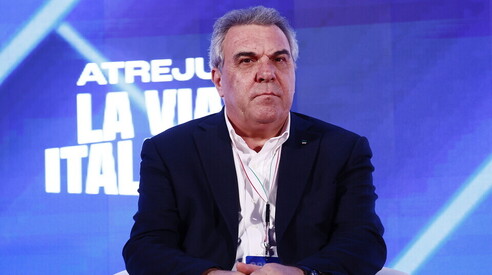Luigi Sbarra: "The unions protesting for Gaza are misusing the right to strike."


The interview
"The strike is the union's tool par excellence, exploited by the unions for political ends," says the former CISL leader and undersecretary for the South. "They should be more cautious, because the consequences can be violent."
On the same topic:
Rome. After a first career in the union and a final summer in the Meloni government, what do you think of the strike called by the grassroots unions for Gaza? "On the one hand, peace flags were waved, on the other, cities were transformed into urban guerrilla warfare...", begins Luigi Sbarra. He then responds: "I think the effect, on Monday, was that of an unacceptable contradiction." Before getting to the implications, however, we'd like to discuss the background with you. As a former secretary of the CISL (Italian Union of Workers' Unions), now undersecretary to the Prime Minister's office with responsibility for the South , what sense do you give to using the right to unionize, specifically to strike, to protest the suffering in Gaza? "The strike is a sacrosanct right, enshrined in the Constitution. But using it for a cause like peace in Gaza raises many doubts."
According to Article 40 of the Charter, "the right to strike is exercised within the framework of the laws that regulate it," that is, the laws of "economic relations." And yet, on Monday, the reason was not economic but geopolitical. Undersecretary Sbarra, what happened? "The strike, I repeat, is the union tool par excellence. What happened, in this case, was that it was misused for political purposes, in an anti-government vein. And to me, it seemed like an abuse, indeed, that distorted its function, which is to regulate economic and social relations, and certainly not to guide battles of a different nature."
The latest strike, it was said, was called by the grassroots unions. And it affected every sector: from public transportation to schools. Yet already last Friday, CGIL general secretary Maurizio Landini explained the reasons for the strike against the Gaza massacre. So much so that now a historical memory issue arises. The last time the CGIL called a demonstration for Palestine, and placed an empty coffin in front of the synagogue in the Roman Ghetto, was the attack of October 9, 1982, which killed a child. The question, then, is: what does the former CISL representative advise the CGIL? More caution or more zeal? I believe that the memory of such tragic episodes should always remind us how essential balance, respect, and a sense of responsibility are when organizing public demonstrations. Also because, returning to the Constitution, the right to strike must be exercised while safeguarding fundamental human rights and the functioning of essential services . When protests go beyond the confines of civil dialogue, the risk is to fuel tensions, misunderstandings, and even violence. In this regard, you spoke of protests of contradiction. "Yes, because peace is not a slogan: it is the absence of violence. And on Monday, we saw the opposite: attacks on law enforcement, blockades of trains, highways, and ports. Entire urban areas rendered unsafe. Behaviors that have nothing whatsoever in common with the people of Gaza. And which are simply destructive acts. There can be no tolerance in the face of such excesses." So? "Therefore, the violent must be isolated and stopped. The strike must not be used to transform social representation into party representation. And the events in Milan, and other cities, demonstrate how dangerous this can be, especially when exaggerated language is used."
Beyond the instrument, which is fundamentally inappropriate, we wonder whether the protests can have any concrete effects. In other words: are Milanese high school students and Roman ATAC workers really marching on the so-called international stage? "Look, what I can say is that permanent conflict doesn't help the cause of peace. In fact, it weakens it. In my opinion, those who chose concrete action have demonstrated true responsibility: raising funds, supporting civilians, building bridges instead of fueling divisions. This is the path to peace. And then, allow me to express my gratitude to the police for their work during the demonstrations. And my thoughts are with the injured officers."
More on these topics:
ilmanifesto





